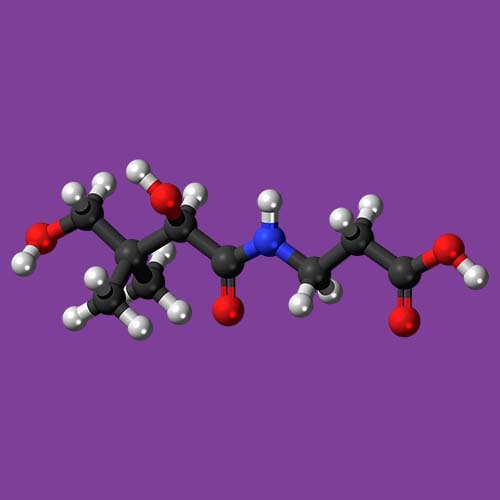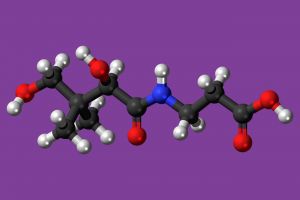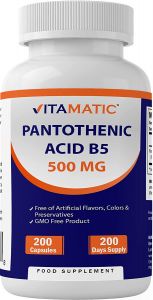Vitamin B5
Pantothenic acid is a type of vitamin B5. It is found in a
variety of plant and animal products, including meat,
vegetables, cereal grains, legumes, eggs, and milk.

Vitamin B5
Pantothenic acid is a type of vitamin B5. It is found in a variety of plant and animal products, including meat, vegetables, cereal grains, legumes, eggs, and milk.
Overview
Pantothenic acid is a type of vitamin B5. It is found in a variety of plant and animal products, including meat, vegetables, cereal grains, legumes, eggs, and milk.
Pantothenic acid aids in the utilisation of carbohydrates, proteins, and lipids by the body. It is also necessary for the maintenance of healthy skin. Vitamin B5 is available in the form of D-pantothenic acid, as well as dexpanthenol and calcium pantothenate, which are synthetic chemicals derived from D-pantothenic acid.
Pantothenic acid is most commonly used to treat pantothenic acid deficiency. Dexpanthenol, a chemical related to pantothenic acid, is used to treat skin irritation, nasal swelling, wound healing, and other conditions, but there is no good scientific evidence to back up these claims.
Source
Sources of Vitamin B5
The best way to ensure you get enough vitamin B5 is to eat a healthy, balanced diet on a daily basis.
Vitamin B5 is a simple vitamin to include in a healthy diet. It can be found in a variety of vegetables, including:
- Broccoli
- Members of the cabbage family
- White and sweet potatoes
- Whole-grain cereals
Other good sources of B5 are:
- Mushrooms
- Nuts
- Beans
- Peas
- Lentils
- Meats
- Poultry
- Dairy products
- Eggs
Uses & effectiveness
It is useful for:
- Pantothenic acid deficiency. Taking 5-10 mg of pantothenic acid by mouth daily prevents and treats pantothenic acid deficiency.
People take vitamin B5 supplements and derivatives to treat a variety of ailments. Among these conditions are:
- Acne
- ADHD
- Alcoholism
- Allergies
- Asthma
- Baldness
- Burning feet syndrome
- Carpal tunnel syndrome
- Celiac disease
- Chronic fatigue syndrome
- Colitis
- Conjunctivitis
- Convulsions
- Cystitis
- Dandruff
- Depression
- Diabetic nerve pain
- Dizziness
- Enlarged prostate
- Headaches
- Heart failure
- Insomnia
- Irritability
- Leg cramps
- Low blood pressure
- Low blood sugar
- Multiple sclerosis
- Muscular dystrophy
- Neuralgia
- Obesity
- Osteoarthritis
- Parkinson’s disease
- Premenstrual syndrome
- Respiratory disorders
- Rheumatoid arthritis
- Salicylate toxicity
- Tongue infections
- Wound healing
- Yeast infections
While people take vitamin B5 for these conditions, there is little evidence that it improves the majority of them. More scientific research is needed to determine its efficacy.
Potentially ineffective for:
- Radiation therapy causes skin damage (radiation dermatitis). Applying dexpanthenol, a chemical similar to pantothenic acid, to irritated skin does not appear to reduce radiation-induced skin damage.
There is some interest in using pantothenic acid for a variety of other purposes, but there isn’t enough reliable data to say whether it would be beneficial.
Vitamin B5 is frequently found in hair and skincare products, as well as makeup. Dexpanthenol, a B5-derived chemical, is found in creams and lotions designed to moisturise the skin.
B5 can help add volume and sheen to hair products. It’s also said to improve the texture of damaged hair from styling or chemicals. According to one study, using a compound containing panthenol, a type of vitamin B5, could help stop hair thinning. It will not, however, cause your hair to regrow.
It can also be applied to the skin to relieve itching and promote healing from skin conditions like:
- Eczema
- Insect bites
- Poison ivy
- Nappy rash
Dexpanthenol has also been used to prevent and treat radiation therapy skin reactions.
Researchers are also looking into the chemical pantethine, which is derived from vitamin B5, to see if it can help lower cholesterol. According to one study, taking pantethine daily for up to 16 weeks can lower LDL-C, or “bad” cholesterol. The study also discovered that it can help reduce the risk of coronary heart disease.
Side Effects
Pantothenic acid is probably safe to take by mouth for the majority of people. Adults should take no more than 5 mg per day. Larger doses (up to 1 gramme) appear to be safe for the majority of people. However, taking larger amounts increases the likelihood of side effects such as diarrhoea.
When applied to the skin, dexpanthenol, a chemical similar to pantothenic acid, may be safe when used in small amounts.
When used as a nasal spray, dexpanthenol is possibly safe when used for a short period of time.
When applied to the eye, dexpanthenol is possibly safe when used for a short period of time.
If you get any side effects, talk to your doctor, pharmacist or nurse. This includes any possible side effects not listed on this page. In the UK you can also report side effects directly to the Yellow Card Scheme By reporting side effects you can help provide vital information on the safety of this medical supplement.
Is this medicine suitable for you?
Take precautions:
- Pregnant. Pantothenic acid is probably safe to take orally. During pregnancy, a daily dose of 6 mg is recommended.
- Breastfeeding. Pantothenic acid is probably safe to take orally. During breastfeeding, a daily intake of 7 mg is recommended.
- Children. Pantothenic acid taken orally is probably safe for children. When applied to the skin, dexpanthenol, a chemical similar to pantothenic acid, may be safe for children.
Consult your doctor
Dosage
- Infants 6 months and younger – 1.7mg
- Infants 7 to 12 months – 1.8mg
- Children 1-3 years – 2mg
- Children 4-8 years – 3mg
- Children 9-13 years – 4mg
- 14 years or older – 5mg
- Pregnant or breast-feeding women – 7mg




